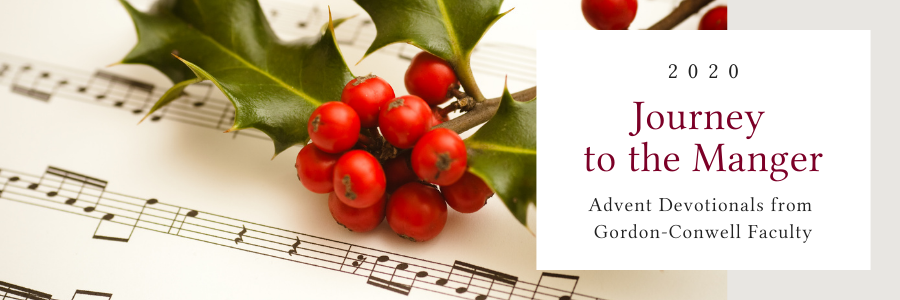Advent Devotional: “Savior of the Nations, Come”

Dr. David Currie
“Advent” literally means “coming,” making it a season of both looking back to Christ’s first coming at his birth and looking ahead to Christ’s second coming at his return. Both comings involve waiting, a small taste of which is experienced in traditions that wait to sing Christmas carols until Christmas Eve.
Thankfully, there are many wonderful Advent carols that can fill the four Sundays leading up to Christmas, each with its own sense of wonder at the comings of Christ and enhanced by the waiting. One Advent carol that embodies how the people of God have waited patiently, expectantly, hopefully, and trustingly is “Savior of the Nations, Come.” Not only do its words express these sentiments, but its tune and the people who shaped its coming reflect the generations of the faithful who have waited and watched, longed and listened for Christ to finish what began at Christmas, “peace on earth,” salvation for the nations, the completion of the Great Commission.
“Savior of the Nations, Come” originated in the 4th century with Ambrose, the Bishop of Milan, who was one of the four great “Doctors of the Western Church.” Ambrose stood steadfastly against the Arian heresy and is considered the father of Western Hymnody. He wanted the congregation to sing in worship and recognized that having lines with the same rhythms helped this process.
In the 16th century, Martin Luther translated “Savior of the Nations, Come” from Latin into German and adapted a chant form for the tune that may have gone all the way back to Ambrose. The minor key captures the sense of longing for Christ’s coming with the last line sounding a note of hope. The most popular English translation from Luther’s German comes from a 19th century American pastor, William Reynolds.
As you listen to various contemporary renditions of this Advent carol, and perhaps sing along yourself, remember Ambrose, Luther, Reynolds, and all the other believers over the past 1600 years who have expressed the same desire for the coming of the Savior of the nations.
Savior of the nations, come,
Virgin’s son, make here Thy home!
Marvel now, O heav’n and earth,
That the Lord chose such a birth.
Not by human flesh and blood
By the Spirit of our God,
Was the Word of God made flesh–
Woman’s Offspring, pure and fresh.
Wondrous birth! O wondrous Child
Of the Virgin undefiled!
Tho’ by all the world disowned,
Still to be in heav’n enthroned.
From the Father forth He came
And returneth to the same,
Captive leading death and hell–
High the song of triumph swell!
Thou the Father’s only Son,
Hast o’er sin the victory won.
Boundless shall Thy kingdom be;
When shall we its glories see?
Brightly doth Thy manger shine,
Glorious is its light divine.
Let not sin o’ercloud this light;
Ever be our faith thus bright.
Praise to God the Father sing,
Praise to God the Son, our King,
Praise to God the Spirit be
Ever and eternally.
Listen to these renditions:
Koine – Contemporary Folk
Robert G. Farrell – Organ & Chorale
Sister Sinjin – Women’s Duet
Learn more about “Savior of the Nations, Come.”
 David Currie is Dean of the Doctor of Ministry Program and Vice President of Cohort-Based Education at Gordon-Conwell. To all of his work, Dr. Currie has brought a passion to nurture thinking Christian leaders. This passion has grown out of over three decades of ordained ministry. Dr. Currie is currently serving as a priest in the Anglican Church of North America and is the faculty advisor for the Hamilton Campus Anglican Formation Program.
David Currie is Dean of the Doctor of Ministry Program and Vice President of Cohort-Based Education at Gordon-Conwell. To all of his work, Dr. Currie has brought a passion to nurture thinking Christian leaders. This passion has grown out of over three decades of ordained ministry. Dr. Currie is currently serving as a priest in the Anglican Church of North America and is the faculty advisor for the Hamilton Campus Anglican Formation Program.